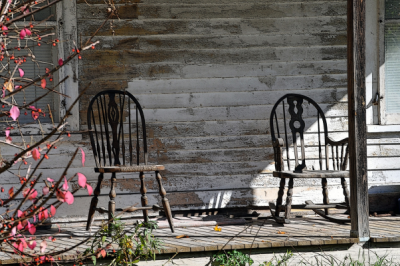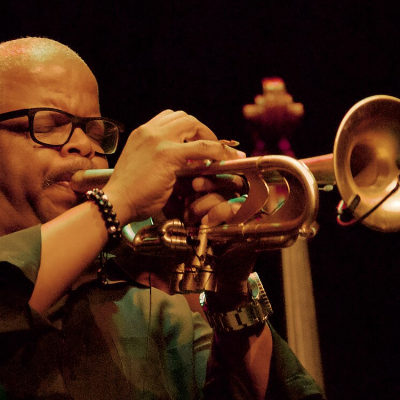.
.
photo by Linnaea Mallette/CC0 Public Domain
.
The Blues Are Always With Us
by Michael L. Newell
.
…..Rain sang off the roof for hours. The ancient on the porch rocked, strummed his guitar, whispered, “Make Me a Pallet on the Floor,” one minute sounding like Sam Chatmon, the next his licks would have made Mance Lipscomb proud.
…..His rocker kept flawless time to guitar’s rhythms. The rain at times sang like a dobro, at other times was a drum in a world of its own.
….. An old woman’s voice from inside the rundown cabin called. “Thomas, if you must play that battered old guitar, play some gospel.”
….. So he strung together an extended instrumental medley to which he added his whispery voice now and again. With a bluesy tint, he entwined, “Shall We Gather at the River,” “Rock of Ages,” and “Nobody Knows the Trouble I’ve Seen.” He ended with a jazzy flourish that would have pleased Joe Pass or Kenny Burrell.
…..He rocked for a time, lightly rapping his knuckles on the arms of his rocking chair, and nodding his head in time to the rain on the aluminum roof. Eventually, his fingers stopped tapping, his head stopped nodding, and he dozed, head flopped to one side, utterly still.
…..Evening owned the afternoon. The storm rose and fell. The old man was motionless.
The gloaming engulfed the landscape. An owl ghosted through a nearby stand of trees. In the distance, a coyote howled and howled again. The old man opened his eyes, shook his head twice, lurched to his feet, waited a minute (holding on to a nearby porch pillar), then slowly slouched indoors, stopped, stumbled back to his rocker, reached down, picked up his guitar, turned back toward the doorway, and hobbled inside.
…..He put the guitar back into its case on a warped, twisted bookshelf, wandered into the kitchen, took down a can of chicken soup, emptied it into a blackened pan, warmed it on the stove, poured the soup into two cracked wooden bowls, put a spoon in each, and carried them into the bedroom.
…..He put the bowls onto a small table, turned to his wife, gently shook her shoulder, muttered, “Supper time, Sally,“ and stepped back. Nothing. No movement. No sign of breathing. He stepped back to her, put an old, small, looking glass up to her lips. .Nothing. He waited.
…..Nothing. Minutes passed. Nothing.
…..Thomas slowly sat down on the edge of the bed. His eyes watered, but no tears fell. He softly sang a rough-hewn a cappella, “Shall the Circle Be Unbroken,” followed by “Angel Band.” The ensuing silence was filled by rising wind, rain rattling off the roof, windows, and door, and occasional cracks of thunder. He stroked her hair once, slowly, kissed a cheek, murmured, “I hope you’re at peace, Old Woman,” went to an antique phone hung on a wall, told the person who answered, “She’s gone,” hung up the phone, and leaned for a long time against the wall.
…..Lost in silence, he had no more music. Even rain had stilled. Only the wind spoke, and the old clock ticking on the wall. In the distance he eventually heard a baby’s cry. He slipped to the floor. He muttered to himself, “I hope you have better luck than we did, little fellow.”
…..He tried to pray. He had no words. He normally prayed by singing, but could not think of a single thing to sing. His guitar on the bookshelf sat there, an abandoned heirloom.
.
___
.
.
Michael L. Newell is a poet, occasional short story writer, and retired secondary school English/Theatre teacher who currently lives in Florida.
.
.
.



































Ahh Michael!! Your story hits me so close to the heart. Thank you for sharing. Last I heard you were in Oregon. Miss you still my !friend
Michael, we have been swapping writing with each other for more than a decade now. From my recollection, it’s always been poetry. This is the first short story of yours I have read, and it is one of your most moving pieces. There’s not a wasted word here. Or if so, very very few. Everything melds and that final murmur about the little fellow sums it up in so many ways –
I’m no poet, Micheal, but I do love a good, emotional, loving, story. This writing feels so personal, especially for our generation. Thank you.
Michael. What you have here, is a really great short story, for several reasons. The use of quotations
for conversation, adds an immediacy. There is very good imagery throughout, which adds to the
story. Such as the chicken soup in wooden bowls. The best thing is the continuous “tone” through the
whole story, using the old and “ancient,” theme. Many very well chosen words (often like poetry),
support this idea. The tone continues very well to the last sentence. It is a very well done, sad and
ironic ending. “His guitar on the bookshelf sat there, an abandoned heirloom.” Way to
go, MLN !
I think this lovely story, really oozing atmosphere, exemplifies the view that the short story form, at its best, can combine the interest and line of narrative and the moving and lyrical qualities of poetry.
The story is touching, and full of great tenderness. The narrative is developed so beautifully with every image contributing to the mood and focus of the story. A life time of love is felt in the old man’s loss of words, the inability to think of any thing to sing that could be an adequate prayer.